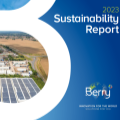

Berry Global proudly accepts its top 50 ranking among America’s Most Responsible Companies, presented by Newsweek and global research firm Statista, Inc. Ranking 35 out of 600 of the most responsible companies in the United States across fourteen industry subcategories, Berry is recognized for its commitment to environmental, social, and corporate governance (ESG).
“A company is a collection of people with a shared vision. Responsible companies ensure their long-term vision includes improving people’s lives and protecting our planet in addition to generating a profit,” said Berry CEO, Kevin Kwilinski. “This high recognition is consistent with what I’ve experienced across Berry within my first 50 days. Our team’s technical know-how and material engineering expertise is second to none, and these exceptional skills and knowledge are put to great use helping our customers achieve their sustainability goals.”
Focus on ESG
Berry has placed special emphasis on its ESG efforts, leveraging its unmatched global capabilities and deep innovation expertise to help customers meet their sustainability goals. With an industry-leading safety record, increased transparency on relevant ESG topics, and robust code of ethics, Berry is proud of its achievements thus far in the areas of corporate stewardship. Compared to 2021, key highlights from the company’s 2022 Impact Report include:
- Increased purchase of post-consumer recycled plastic by 28%
- Increased circular plastic purchased by 21%
- Achieved Scope 3 GHG emissions target four years in advance and increased the target
- Reduced Scope 1 and 2 (operational) GHG emissions by 5% and Scope 3 (value chain) GHG emissions by 5%
- Increased percentage of women in salaried roles by 5% and of people of color in U.S.-based salaried roles by 6%
- Increased average training hours per team member by 35%
- Increased the number of suppliers evaluated in risk management software by 353%
About the ranking
The list of America’s Most Responsible Companies begins with a pool of the top 2,000 public companies by revenue based in the United States. For the environmental category, companies are evaluated on over 30 key performance indicators (KPIs) in areas such as waste, emissions, energy use, water use, environmental engagement, and long-term performance. For the social category, KPIs span the dimensions of leadership diversity, employees, philanthropy and engagement, and long-term performance. Lastly, in the governance category, areas of evaluation include disclosure and transparency, economic performance, and long-term performance. In addition, a public survey is conducted to ask 17,000 U.S. citizens to evaluate the company’s ESG performance in general. All elements are weighted to produce a final score.














































